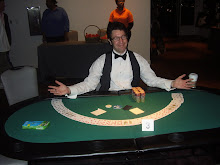This was my Q&A post about Casino School, which I graduated two months later. Feel free to ask any questions I didn't answer.
Hey, everyone...
So obviously I haven't posted in a while, largely due to being busy with a new script and going to poker dealer school, so I'm going to take advantage of this lull of a weekend and blather a bit starting with this handy FAQ on what the hell I'm doing in casino school.
Why casino school?Part and parcel with being a screenwriter out here is finding alternative means of income during the inevitable dry spells. For me, that's been mostly office jobs, many of them temporary, which is to say, erratic, lacking in benefits, modestly salaried, and frequently just sort of awful, and in the last couple years, few things could cheer me up from the doldrums such jobs would cause more effectively than poker. So the fact that it took this long to occur to me to make poker my day job is really quite sad, but anyway, I had the belated epiphany back in March, just as my last, torturous office job was winding down, and here we are.
Also, it's a way to meet cocktail waitresses.
What do they teach at casino school?There's a table games course (blackjack, baccarat, and pai gow) and the one I'm taking, the poker-dealer course, which covers Limit Hold 'em, Hi-Lo Omaha, Hi-Lo 7-card Stud, and Mexican Poker.
What in God's name is Mexican Poker?Yeah, I hadn't heard of it either, but basically it's a 5-card stud game; the 8's, 9's and 10's aren't in the deck, you choose whether you want your card up or down on 3rd and 4th streets, there's a joker that's "wild" when dealt down and is either an Ace or completes a straight or flush when dealt up, a flush beats a full house--
Okay, stop, stop, stop, never mind. That sounds insane.It is.
So how long is the course?As long as it takes, which is to say that it's not really a "course" in the sense of there being "classes" to attend. Once you've learned the mechanics (shuffling, dealing, chip-cutting, etc.) and passed the written test, you're ready to start dealing Hold 'em (the students all take turns "shilling" for each other). Then when you're ready, they give you a "pre-audition", where basically you deal for 20 minutes and try not to screw up at all. Pass that, and you move on to the next game. Pass all four games, then you take the final, which is one hand of each game. Pass that, and you're ready to pound the pavement with your certificate.
Okay...So how long does all THAT take?It varies, but if you're there every weekday and get in 3-4 "downs" (20 minute segments) per day, you're probably looking at 2-3 months, depending on how many times you screw up your tests.
So where are you now in the class?I just passed Hold 'em and am on the verge of passing Stud, so I think I'm looking at another 4-6 weeks or so, provided that I don't botch the remaining tests as many times as I botched the Hold 'em.
How many--Move on.
Does all this dealing make you a better poker player?I'm hoping it will eventually, but I wouldn't say it has yet, because the "shilled" games we play at the school does not remotely resemble how real games go, since a) We're not playing for real money, and b) Most players stay all the way to the end whether they have a hand or not (sometimes they don't even look at their hands), so the dealer can practice reading hands.
What's the hardest thing about dealing?Well, creating side pots and learning the half-bet rule both take some time, but once you get those down, the hardest part is remembering to "clear" one's hands (i.e., briefly turning the hand palm up, so the ceiling camera sees it) EVERY DAMN TIME you touch the chips. Seriously, that's an exhausting habit to form. But I suspect this will be child's play compared to dealing with actual casino patrons in varying degrees of inebriation.
Hey, why are so many dealers Asian?I have no idea. The students at the school are an eclectic mix of races and ages (not genders, though...It's mostly guys.), but yeah, when I head down the block to Hawaiian Gardens after school, the dealers are almost entirely Asian. (So I figure I'll have the "token" thing going for me...)
How much do dealers make?It's mostly tips, but getting tipped every hand adds up; I'm told a full-time casino dealer makes somewhere in the $50-70K range, which beats those horrendous temp jobs AND comes with benefits.
Cool. Well, good luck with it.(takes tip, taps it on the table)
Thank you, sir!



